Colorado Supreme Court upholds DPS search of student on ‘safety plan’
The Colorado Supreme Court agreed on Monday that Denver Public Schools personnel acted constitutionally when they searched a student’s backpack without a warrant or suspicion of wrongdoing, but instead pursuant to a “safety plan” created after his prior criminal conduct.
The case appeared to be the first to address how the Fourth Amendment’s prohibition on unreasonable searches and seizures applies to students when school officials’ actions are based on an agreed-upon, but open-ended framework subjecting a student to searches.
Without saying how long a safety plan could remain in effect before it became unreasonable, Justice Melissa Hart concluded in the March 25 opinion that a safety plan in existence for one year gave reasonable grounds for administrators to search a student identified as J.G.
“A search carried out in accordance with a previously established safety plan is reasonable at its inception because the plan diminishes the student’s expectation of privacy,” she wrote. “Additional individualized suspicion stemming from the student’s behavior is not required. Therefore, the search of J.G.’s backpack was justified at its inception.”

While J.G.’s appeal to the state Supreme Court was pending, safety plans came under scrutiny after East High School student reportedly shot two administrators during a routine search pursuant to his own safety plan.
“The result of the case is unsurprising, given the need for school safety. One good question suggested by the case is just how long an individualized school safety plan could be used to justify the search of a student such as J.G.,” said Timothy R. Bussey, a criminal defense attorney. “To be reasonable, a continuing safety plan should be subject to periodic review, and the student should have an opportunity to be heard.”
J.G. was a ninth-grade student John F. Kennedy High School who was adjudicated delinquent — the juvenile equivalent of being found guilty — of two gun-related offenses. In response, school officials developed a safety plan for him in early 2019. Among other protocols, J.G. was not allowed access to backpacks or lockers and would need to be searched daily.

iStock
J.G.’s mother attempted to enroll him at a different school for the 2019-2020 school year, but she ended up hastily re-enrolling him at Kennedy the week before school started. A “re-entry meeting” was supposed to happen with J.G., but it never did. Instead, J.G. attended school for two days without being searched.
On the third day, the school resource officer and an administrator took J.G. aside and demanded to search his backpack. J.G. resisted, prompting the officer to restrain J.G. while another security official examined the backpack. A loaded handgun was inside. The officer placed J.G. under arrest and a judge again adjudicated J.G. delinquent for the offense.
On appeal, J.G. challenged the constitutionality of the school officials’ search. A Court of Appeals panel, following the U.S. Supreme Court’s precedent, determined reasonable suspicion was not necessary. Instead, if J.G.’s safety plan was still in effect, it was reasonable for J.G. to expect daily searches.
“We note that the Safety Plan doesn’t specify a timeframe and that it also doesn’t include an expiration date. Thus, we construe the Safety Plan as remaining effective as long as J.G. attended the same high school,” wrote Judge Craig R. Welling.
At the state Supreme Court, the parties disputed whether J.G. actually had notice his safety plan was in effect for at least the following school year and possibly indefinitely.
“What evidence is there that he stopped having notice?” wondered Chief Justice Brian D. Boatright during oral arguments. “He assumed it’s a new school year, therefore, I’m free?”
In the court’s opinion, Hart acknowledged the circumstances of J.G.’s reentry to Kennedy may have contributed to confusion about the safety plan’s continued existence.
“Summer vacation and the start of a new school year are transitional stages when circumstances and expectations may change for teenagers,” she wrote. But ultimately, “J.G. had sufficient notice of the search requirement to diminish his expectation of privacy in his backpack.”
In examining whether the search was reasonable, Hart cited two types of U.S. Supreme Court cases interpreting the Fourth Amendment’s applicability to schools. One category of cases encompassed officials’ reasonable suspicion that a specific student had broken a rule — which the Court of Appeals applied when deciding J.G.’s case.

Denver Public Schools
The other category addressed “special needs” searches against groups of students. Drug testing student athletes, for example, need not be rooted in suspicion of any particular student.
“The school administration’s search of J.G. on August 29, 2019, does not fit neatly into either of the two types of school searches,” Hart conceded.
Although she explained J.G.’s backpack search more closely resembled the first category, Hart wrote that the administrators’ search cleared the constitutional threshold in either type of case when factoring in schools’ need to balance students’ rights with broader safety.
“This responsibility can sometimes justify suspicionless searches,” she concluded.
The Supreme Court noted its holding applied to an “individualized, weapons-related safety plan,” but it did not suggest when such plans for students might reasonably expire. After the Court of Appeals’ decision, Stan Garnett, a former Boulder County district attorney and school board member, said he worried about the potential for safety plans to be overly punitive.
“It’s very important that our schools become environments where young people can mature, be silly, use bad judgment in a proportionate way,” he said at the time. “What really concerned me was that the schools, in an effort to make sure they have a safe environment, have overreacted and become very strict.”
The case is People in the Interest of J.G.









